Gianni Infantino: Fifa’s re-elected president spins an ever-spreading web of influence
A stand-alone runner to oversee the game despite vocal critics in several quarters as the most controversial World Cup in history approaches – but what is Fifa’s real role and responsibility now?
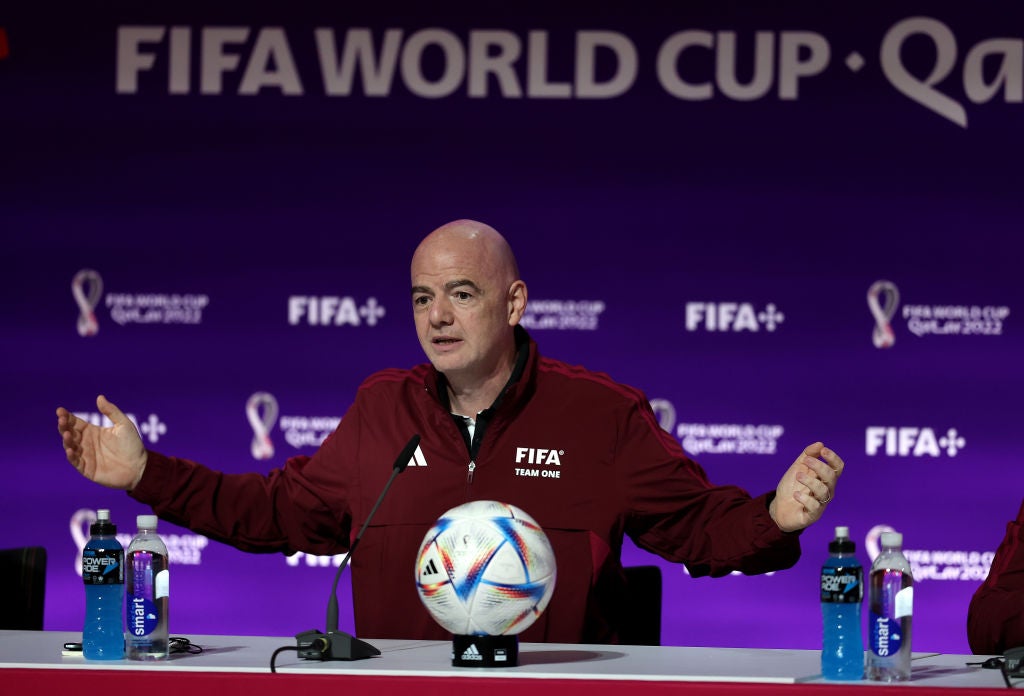
Your support helps us to tell the story
From reproductive rights to climate change to Big Tech, The Independent is on the ground when the story is developing. Whether it's investigating the financials of Elon Musk's pro-Trump PAC or producing our latest documentary, 'The A Word', which shines a light on the American women fighting for reproductive rights, we know how important it is to parse out the facts from the messaging.
At such a critical moment in US history, we need reporters on the ground. Your donation allows us to keep sending journalists to speak to both sides of the story.
The Independent is trusted by Americans across the entire political spectrum. And unlike many other quality news outlets, we choose not to lock Americans out of our reporting and analysis with paywalls. We believe quality journalism should be available to everyone, paid for by those who can afford it.
Your support makes all the difference.On Sunday at Al Bayt Stadium, Gianni Infantino will be more than willing to share the spotlight with the Emir of Qatar, but it isn’t a privilege the newly re-elected Fifa president affords many. Take a story from a few weeks ago. With the World Cup 2022 so close, the Lisbon-based Web Summit wanted both Arsene Wenger and Infantino to come and do a talk. Negotiations broke down for a few reasons, but one element raises a chuckle from those with knowledge of the talks. There was a request for Infantino to have a more prominent speaking slot than Wenger.
The story does tally with a common refrain from a lot of people you speak to about Infantino.
“It’s all about him.”
There was then whatever that World Cup opening press conference was. Infantino surpassed himself as well as Sepp Blatter with a cascade of frankly astonishing statements. The Fifa president attempted a statesman’s address but essentially just showed why the game is in the state it is. You could joke it was the biggest miss to open a World Cup since Diana Ross’s penalty, except the truth is so many of the issues he blithely glossed over are so serious, from the conditions of migrant workers to LGBTQ+ concerns in Qatar.
One defence of Infantino made by those who have had to work with him through many such speaking debacles is that “he’s a showman” and “you have to realise he just gets up and goes with it”. Quite. Other descriptions vary.
“King of sportswashing.” “Megalomaniac.” “Brilliant politician.” “Buffoon.”
And, as Fifa would say is most important despite so many off-the-record criticisms, “re-elected president endorsed by over 200 federations, including over 50 from Uefa”.
Amnesty International wasn’t shy in offering its own view last week. Secretary general Agnès Callamard said Infantino’s letter to federations about “sticking to football” was a “crass abdication” of Fifa’s accountability for migrant worker abuses, and accused football’s ruling body of remaining “silent” and “dodging the topic”.
The letter infuriated as many within the game as outside it. Officials at some qualified nations have been astonished that Infantino would have the gall to request this when it is Fifa’s very approach to this World Cup that has invited questions and – in the words of one source – is “doing real damage to the game”. It should be noted that some federations, such as those from Brazil and Korea, supported the sentiment.
There were still eyebrows raised when Infantino started talking about a ceasefire in the Ukrainian war at the G20. That doesn’t scream non-political World Cup.
One highly influential official’s immediate response was “the lack of self-awareness is astonishing, even after everything that has gone before”.
And he followed that with that opening press conference.
Such stories feed into greater debate about Infantino’s very vision for the game, just as he oversees the most controversial World Cup in history. NGOs would say his Fifa has unquestionably failed in its commitments to remedy human rights abuses and use the game’s “capacity for good” to effect real reform in Qatar.
His detractors would say that only adds to the list.
There was the attempt to introduce the biennial World Cup, which has been described within European football as a “complete disaster”, and the use of Wenger, described as “cowardly”. There was also the general cold war with Uefa, which saw Infantino outmanoeuvred by Aleksandr Ceferin.
Others would go even deeper and point to failures in women’s youth football and changes to big competitions, although there is admittedly some debate about both.
Fifa stridently defends its record on the women’s game, pointing to how Saudi Arabia has departments for women’s football and how it has the only analysis of the growth of the women’s game that exists.
One federation head, meanwhile, says Infantino could “be seen to be taking Fifa in the right direction”, and his defenders – the majority of them outside Europe – say he is finally a figure looking to spread the immense wealth of the game more equitably.
Such a disparity in views raises questions about what Infantino’s motivations for doing the job actually are, as well as what the modern Fifa is actually supposed to be for.
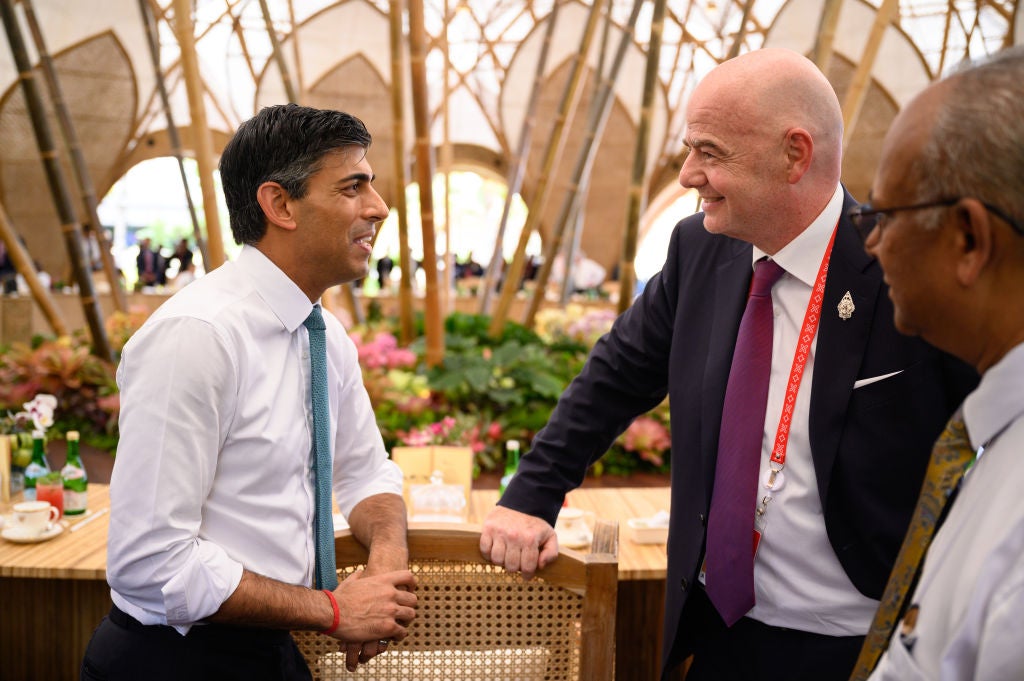
The global governing body is in a curious position in that it is supposed to be the game’s ultimate authority, but it is almost powerless to tackle major problems such as sportswashing, competitive balance and financial inequality. Fifa is a bit like Opec and its relations with the oil companies in that sense.
There is a view, however, that Infantino’s presidency has actually made such problems worse. It could be said that he’s emboldened and supported Qatar, Saudi Arabia and the United Arab Emirates while courting China, with all of this coming amid plans for a disruptive Club World Cup as he also expands the World Cup itself.
Fifa would say that’s just a necessary part of the role, and that positives such as Israeli and Palestinian fans going to the World Cup together come from such meetings.
The questions about his vision are intertwined with persistent wonder about how he ever became Fifa president at all. Infantino had no real support. Many of those who worked with him at Uefa find it difficult to square the competent lawyer they knew before with the extravagant figure they see today. Infantino was previously known for conducting the Champions League draw, but even that was seen as odd for a Uefa general secretary – if not as eyebrow-raising as how he could go from there to the most powerful position in football.
“It’s an incredible leap,” one source who has worked with Infantino says. “You could say it shows a courage to take on big challenges.”
Some now see the presentation of the draw as part of a longer game to grow his image.
The issue was that he was still viewed as Michel Platini’s “bag carrier”. Infantino wasn’t considered part of the former Uefa president’s inner circle and didn’t seem to be involved in the big decisions.
It is possibly precisely this, however, that propelled the Swiss-Italian to the top job once the 2015 controversies engulfed football and shook up Fifa. There was a huge vacuum.
Although Platini had been expected to succeed Blatter, the need for the former French star to clear his own name meant he had to step back, leaving Uefa looking for a nightwatchman as their candidate. Infantino suited this need. It was how Fifa went from a presidential candidate of immense football stature in Platini to “the man who got the balls out”. It was just that Infantino had much bigger ambitions.
The 52-year-old is said to have fallen out badly with Platini now, but senior football figures of the time maintain he was not that popular with any members of the Fifa executive committee or the associations. If so, it represented a huge bet that he made work.
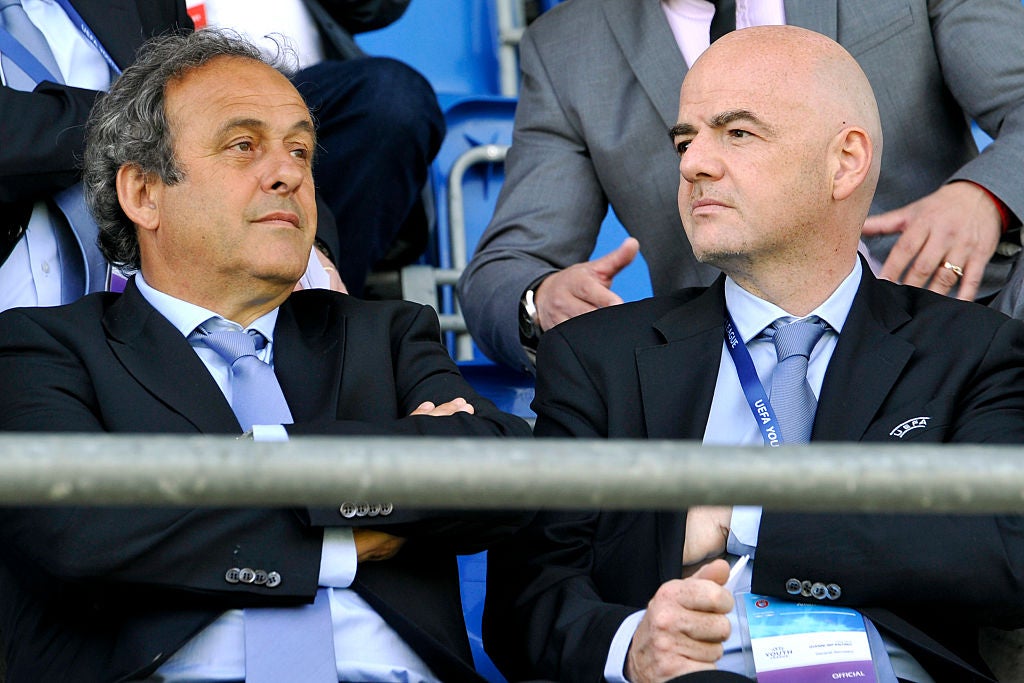
Part of his success might have been down to a genuine charm and good communication skills. Infantino is always ready to show the range of languages he speaks, including Arabic thanks to his Lebanese wife.
The machinations of the time might have also influenced how Infantino has gone about the job.
It is at this point that interpretations are governed by suggestion, assertions and suspicions rather than hard fact. Football is currently going through a volatile period in terms of its political intrigue. It is also where so many of the forces that are reshaping the modern game are coming together.
Infantino is obviously astute enough to see that the true power in the game lies with the big clubs and the big players, but these are all in western Europe, where he is now on the outside. One widely held theory within Uefa federations is that he is trying to work his way around this to secure more of this power for Fifa.
Whoever controls the clubs, after all, controls the game. Figures such as La Liga president Javier Tebas have already accused Infantino of being involved in the European Super League project.
There have already been significant political shifts, albeit away from the game’s power base. Infantino quickly cultivated support in the Middle East, Asia and Africa, which had already made many in Uefa start to feel “alienated”. Sources within the latter said they felt there was a sense that “fat Europeans aren’t prepared to give up wealth”.
Whatever the truth, the landscape has given Infantino this immense power bloc that has seen him secure another term and consolidate his medium-term future as Fifa president. His defenders would say the fact that he was endorsed by more than 200 federations shows the narrative is wrong. His critics would counter that existing politics made it inevitable since no one ran against him and few want open war.
In one of his main bases, the Confederation of African Football, the installation of Patrice Motsepe as president and Veron Mosengo-Omba as general secretary is seen as hugely significant because both are Infantino loyalists. Norwegian magazine Josimar has since reported that the Fifa president was indeed “in the process of being investigated by the ethics committee for interfering in the CAF presidential elections in March this year”.
An argument put forward within Fifa is that the governing body had previously been criticised for not doing enough about corruption in Africa, but is now being criticised for being too hands-on.
“He can’t win,” one supporter says.
Something that hasn’t provoked such emotion has been the corresponding launch of an African Super League. It has attracted none of the opprobrium directed at the European project, despite similar concerns about disparities in wealth distorting the game.
This does point to an ongoing shift in which Infantino is a player. It’s almost forgotten now, but the big expectation at the start of 2020 – before Covid and the ESL announcement – was that the expanded Club World Cup was going to be the force that split the game.
The competition was supposed to be held in China through billions in funds from Saudi Arabia and Softbank, with many fearing the level of prize money and the size of the competition would drastically reshape the sport. It was widely seen as the first big step in this anticipated move to prise some of the club power away from the Champions League.
A concurrent plan was to bring the World Cup itself to China in 2030, but the state’s drift away from globalisation has instead seen Infantino move further towards the Middle East.
It is here where Qatar 2022 occupies such an interesting position, and not just because of its place in the calendar.
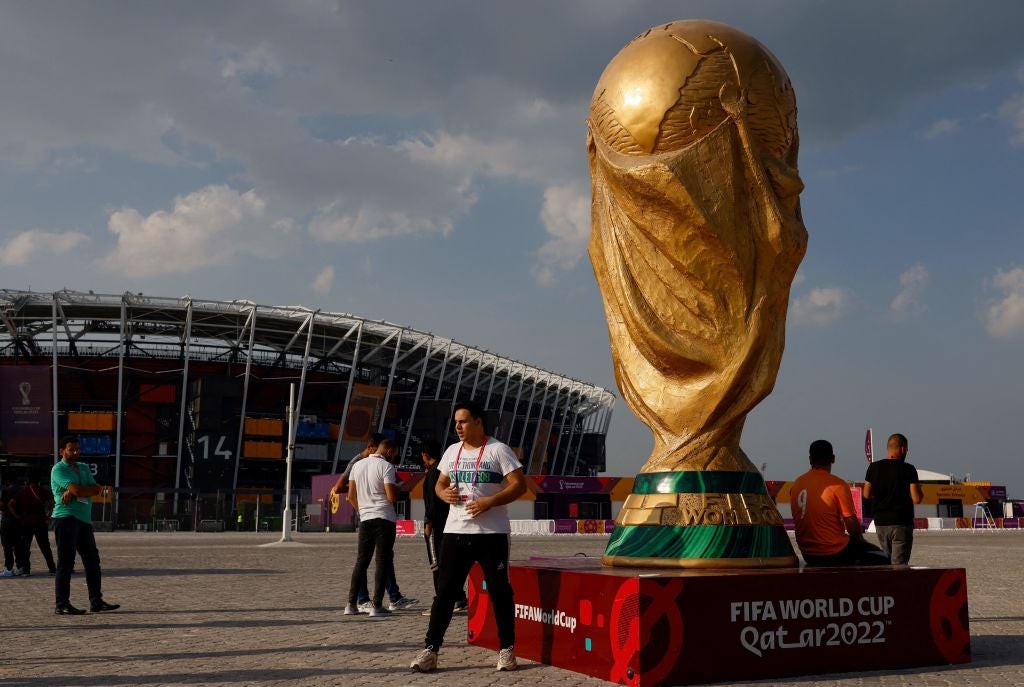
While Fifa is now rightly criticised for failing to leverage the World Cup for reform, it has long had a complicated relationship with the controversial host. Some within the governing body spent many years investigating whether it could move 2022, since they “envisaged disaster”. When that didn’t happen, there was the brief plan to expand 2022 to 48 teams so it would have to be spread around the entire region, which would conveniently have brought in Qatar’s great political rival, Saudi Arabia.
Infantino’s links there have long been strong and appear to go far deeper than those in Qatar, though he’s been living in Doha for the last few months.
A further twist to this is that Uefa and Qatar seem to have the better relationship, which has only been deepened by Paris Saint-Germain president Nasser Al-Khelaifi rising to lead the European Club Association in the wake of the downfall of the ESL.
Uefa and Fifa have meanwhile become increasingly distant from each other, with relations at their most fractious around the biennial World Cup push.
This has provoked more politicking than anything else.
Fifa insists it was all an attempt to spread the wealth of the game and finally sort out a hugely problematic calendar. The fact is that these remain legitimate concerns. The South American confederation Conmebol also initially supported the plan. Fifa would also point to how this is a central part of Infantino’s vision, which is broadly to grow the game, develop football in other continents, spread the wealth and, especially, evolve the women’s game.
Figures in Uefa and the club game, however, firmly believe the entire plan was just a bait-and-switch to force the European game into accepting a new Club World Cup instead.
Whatever the reality, it is difficult to dispute that Infantino was politically outmanoeuvred here. Rather than risk being railroaded, Conmebol and Fifa struck up a rare alliance and almost hinted at a future without the World Cup – Fifa’s great financial source – by setting up an Atlantic Nations League.
That has led to suspicions on the other side. Many within Uefa now wonder about a possible carve-up for future World Cups. The expected bidders for 2030 indicate the future landscape. Spain-Portugal-Ukraine have already announced their intentions. Uruguay-Argentina-Paraguay are expected to follow, to commemorate the World Cup’s centenary, but they might wait until 2034 so as to not split the “emotional” vote.
On the other side, now China is not an option, it is commonly believed that Infantino’s preferred bid would be Saudi Arabia-Egypt-Greece.
That would be a frankly incredible prospect so soon after Qatar. Such a host would bring all of the same controversies, from a mid-season World Cup to human rights, but by orders of magnitude.
It would, however, serve to make Saudi Arabia indebted to Infantino.
That could be valuable if it is true his plans are to fund an expanded Club World Cup again.
Even the next World Cup is being viewed within such a context. The 2026 tournament across USA, Canada and Mexico will be the first run 100 per cent by Fifa, so it won’t have a local organising committee. That will mean a direct working relationship with the host cities – effectively cutting out the US Soccer Federation and the MLS – as well as direct access to the US market. That could prove even more valuable if a prospective Club World Cup were to bring in American clubs. The US would be the natural home for such a competition given its infrastructure.
It should be stressed that much of this is speculation and suspicion, and what Fifa sources would describe as a “very specific narrative being peddled”.
Some of the facts of 2026 have still raised eyebrows, mind.
“It’s remarkable given that it’s only a few years since the FBI called Fifa a criminal organisation,” one connected figure says. “Now it’s trying to go into America and run the show unsupervised.”
The politics go even deeper and come back around.
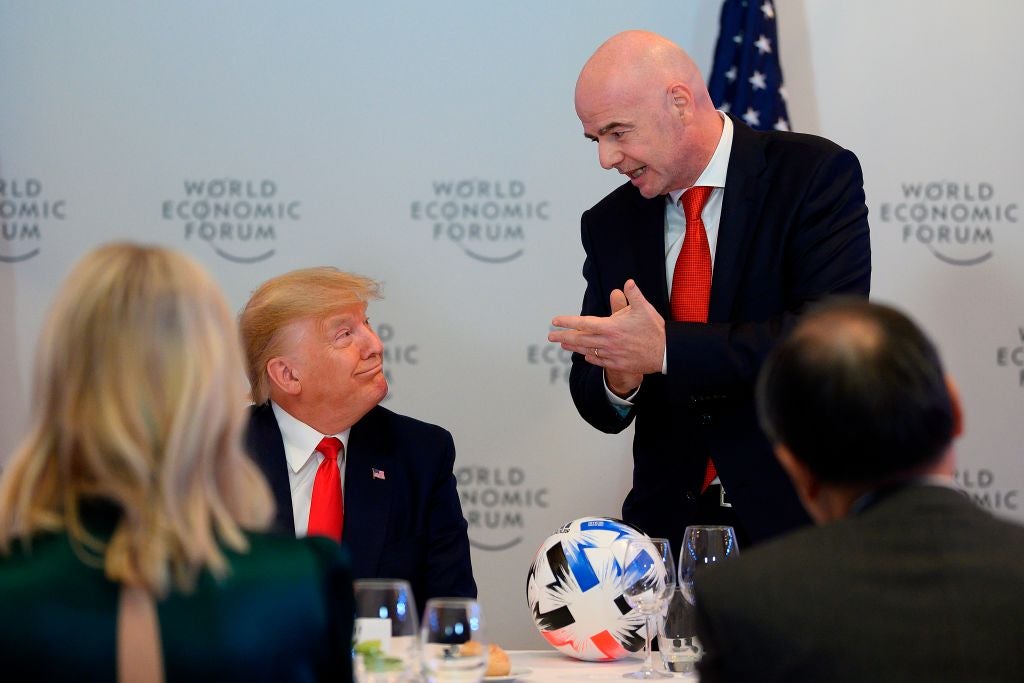
One of Infantino’s main connections in the US is Robert Kraft, the owner of the New England Patriots gridiron team, as well as the New England Revolution football club, and one of the founders of the MLS. Kraft is very close to Donald Trump, with whom Infantino has developed a relationship. One source maintains that the Fifa president once organised a dinner for Trump at Davos.
There’s another common link: Saudi Arabia.
Sources in the successful 2026 bid say they feared they weren’t going to get over the line, when the voting started to turn.
Many later took note of an instructive Vanity Fair piece, which reported that Jared Kushner had been crucial to winning 2026. One of the magazine’s sources says Trump’s son-in-law took a surreptitious trip to Saudi Arabia and directly asked Mohammad bin Salman for Saudi Arabia’s vote.
“He was asking for a very large thing – to vote for the US instead of a more natural partner in Morocco,” this person says. “And yet they were very willing.”
Such accounts touch on another widespread criticism of Infantino, which is how willing he is to court autocrats. Many see this as going way beyond the realpolitik of the role. One of the most infamous photos in modern football is Infantino sat between Vladimir Putin and bin Salman at the opening game of the 2018 World Cup.
“He is constantly distracted by wanting to be beside the most powerful people in the room,” one source says.
Fifa would ask who else he is supposed to sit beside at such a fixture.
Some of the perspectives might admittedly say more about this sort of role than about Infantino himself.
To be the president of sporting bodies such as Fifa or Uefa can be an intoxicating thing. It is all the pomp and circumstance of a head of state, but with none of the responsibility, or anything resembling a multiparty system that acts as a check. You instead have world leaders coming to you because you can bestow them with the power of football. A private jet can be summoned whenever.
“You could argue that, whatever Infantino’s personality, he has become a manifestation of the structure of Fifa,” one figure who knows him says. “He’s also become a manifestation of the structural conflict that exists between Uefa and Fifa.”
Many believe this is the source of these increasingly astounding comments on platforms such the European Parliament or the G2, and then Saturday’s press conference.
It has nevertheless led to growing talk that he’s taken on some of Blatter’s characteristics, but without some of the biggest negatives.
There’s a belief that, like his predecessor, Infantino wants a Nobel Peace Prize. There’s talk of micromanagement of teams around him and a lack of communication with the Fifa Council.
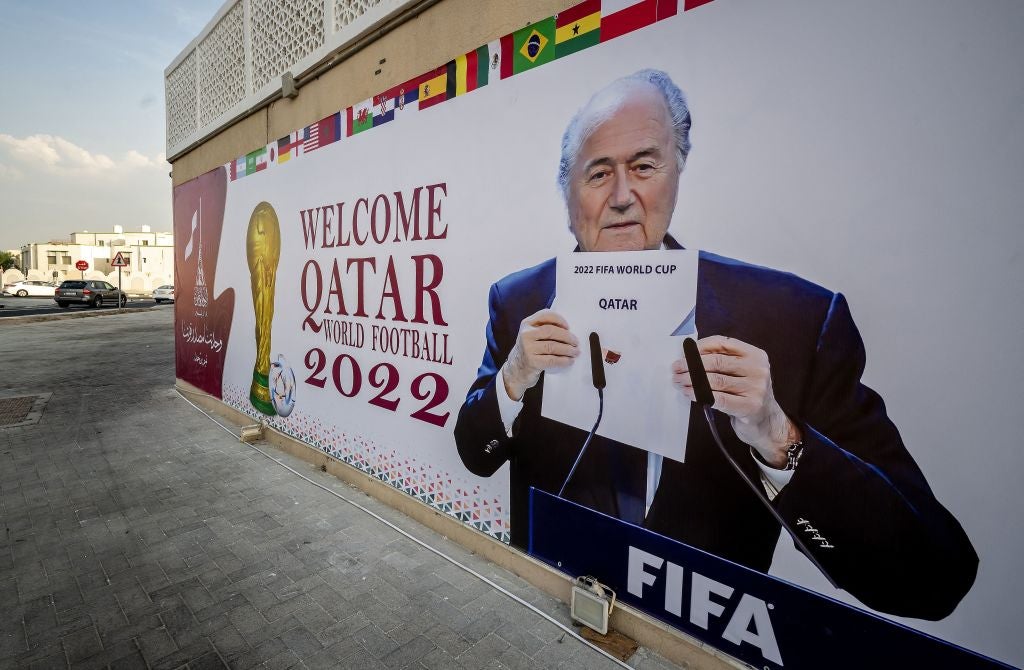
The governing body itself disputes that, and Infantino went for dinner with council members as well as Uefa members on Thursday.
Infantino was due to face the press on Saturday, where there will have been more questions about compensation.
Both Fifa and Qatar have argued they are “complicated to design and administer”. No more so than a World Cup in an area the size of Dublin. A series of sources insist it is actually Qatar that is resistant to this, because it does not want to accept responsibility. The question left hanging there is why Fifa isn’t pushing on this.
It all loops back to the question about what Fifa and its president should actually be standing for, not to mention the World Cup itself.
There is a growing argument, as with Uefa and the Champions League, that it is preposterous a global sporting body is competing in commercial space in that way; that it shouldn’t be promoting as well as governing – that there should be separation.
“I’ll say one thing,” one high-profile figure stresses. “Blatter, for all his faults, cared more about football. For Infantino, it’s all about himself.”
Fifa would point to Thursday. Almost all of the federations endorsed Infantino himself.
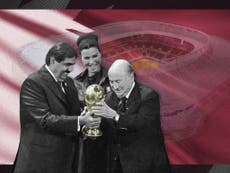



Join our commenting forum
Join thought-provoking conversations, follow other Independent readers and see their replies
Comments